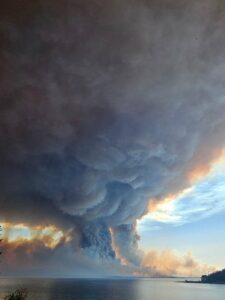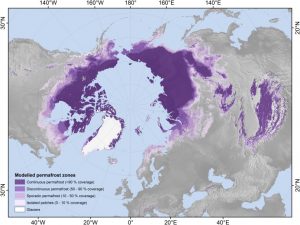The first global heat wave, across the Northern Hemisphere, land and sea, just happened in July 2023. After the hottest June ever, we burned through four days with the hottest global temperature recorded by humans on this planet. After a fast review of world news on heat and floods, Alex replays interviews with Princeton’s Jane Baldwin (”Back-to-Back Heatwaves”) and Canadian scientist Merritt Turetsky (”Abrupt Permafrost Thaw”).
Listen to or download this Radio Ecoshock show in CD Quality (57 MB) or Lo-Fi (14 MB)

It is possible this week new heat records will be set in Europe, hottest ever, and maybe in Death Valley California, the highest temperature we’ve ever seen on Earth.
This is it, and it is terrifying. From coral to wheat fields, from Antarctica to polar permafrost, Nature is going through harsh changes of heat, floods, and violent storms. Human polluted the atmosphere, too much, too long. Now we pay for the free ride of fossil fuels, meat diets, and over-consumption as a right, your duty as a citizen, your measure of meaning. That has to be over.
The event is a hyperobject: far too enormous to grasp now. Words fail. In the radio program, we begin with a fast collection of news bites recorded around the world.
Mass media predictably leave out super important stories. Hardly anyone mentioned the brutal heat in North Africa. There was a new night-time high for all of Africa set last week in Algeria. Associated Press writes:
“Temperatures were so brutally hot Thursday in Adrar, Algeria, that the temperature never got below 103.3 degrees (39.6 degrees Celsius ) even at night when it is supposed to cool. That was the hottest ever nighttime low for Africa, according to weather historian and climatologist Maximiliano Herrera.”
Humans need a cooler night to survive extreme heat days. When it stays hot like that, like the 90 degree F plus night in Miami last week – then our core body temperature is tested. When heat lasts for days, and does not cool down enough at night, that is when humans, livestock, and wild animals from birds to bats die in big numbers. Flowering plants like tomatoes will not set fruit without night cooling. Enzymes in wheat break down. The world food system will surely falter as we keep heating the planet with our fumes.
HEAT AND EXTREME RAINS
For three decades, scientists knew that a warming atmosphere would hold more water vapor. That will come down as heavier rains. In earlier days we had no idea how extreme those rains would become. But is there a direct relationship with heat waves happening at the same time? That is still being studied.
I first suspected a direct relationship in 2010. Extreme heat lead to record forest fires in Russia which left hundreds dead and the wheat crop devastated. I covered that with a guest from Greenpeace Moscow. Then it got wild, with unbelievable rains hitting Pakistan, flooding up to one third of the country. It was like a line of stalled systems, with burning heat in the north and flooding rains to the south. Both stalled and did their worst.
Look at what is happening right now, this June and July of 2023. You just heard the insane heat records falling all across the Northern Hemisphere, including in the hot seas. In Western media, we heard much less about flooding rains – even during unbearable heat, smashing northern China and Japan. Sweating in humid heat, there were landslides, flooded cities, and wrecked crops. The same thing happening in Northern India. You may have seen footage of bridges in India swept away, along with villages and citizens. Many drowned.
Most of you could not escape reports of flooding in New England. The capital of Vermont flooded. Roads and homes in New York State were wiped away. The pattern of rain and storm after storm continued for over two weeks. All that is happening at the very same time horrible heat has sat over the American South and West. Are we seeing a pattern here? Can we expect extreme rains to develop along with extreme heat? How does it work? This is not the future any of us expected.
CANADIAN NORTH IN FLAMES
(Could endanger the world)
Less reported in the news: a giant threat to humanity is rising with the heat in Canada’s north as well as Siberia. As you know, the great boreal forests across vast stretches of Northern Canada are on fire as never before. These are record fires, releasing more carbon into the atmosphere than all of Canada’s other emissions. This alone will speed up climate change.
Even where not burning, the heat is moving into Canada’s far north, advancing another threat even greater than fire. According to Environment Canada meteorologist Jesse Wagar, a temperature of 37.4C, Fort Good Hope in the Northwest Territories (NWT) saw “the hottest temperature recorded that far north in Canada.” The town of Norman Wells is located on the north bank of the Mackenzie River, 145 km south of the Arctic Circle. Recently, temperatures reached almost 38 C, in Norman Wells, over 100 degrees Fahrenheit, almost at the Arctic Circle. It was again their hottest day ever. The city of Inuvik, just 100 kilometers, 62 miles from the Arctic Ocean got to 33 degrees C, 91 F. Other temperature records were broken in the Yukon.
All this means the release of carbon and even more dangerous methane will spike as the permafrost thaws. There is more carbon in the permafrost than in Earth’s atmosphere currently. There are no words to express how dangerous this trend is for the future of humanity and life as we know it. The Arctic methane surge will not happen overnight, or even in the next few years, but once this cycle starts nothing can stop it. At some point, even if humans stopped all fossil fuel emissions, it is possible warming at the Poles could continue to heat the planet beyond survivability for this civilization, and possibly for our species. We have only a short time to reach Net Zero with emergency action. Waiting until 2050, later, or never, is not an option.
Along with many others, I’ve been working on heat as a major threat, likely the major threat, to a great unraveling of our common enterprise. I collected about 20 interviews from scientists, doctors, and authors on heat impacts and put them in my e-book called “Surviving the New Age of Extreme Heat”. You can get that at my web site.
In a coming show, I will be speaking with Jeff Goodell, author of the new book “The Heat Will Kill You First: Life and Death on a Scorched Planet”. Keep your ears out for that.
By 2020, new types of super heatwaves emerged in this rapidly warming world. We went through back-to-back crushers testing humans and all species. They blasted whole continents and even wrapped around a hemisphere. More than a billion people at a time struggled to cope and even to live through it. Tens of thousands did not make it.
During the summer of 2019, more than a billion people in India suffered through a massive heat wave. In Japan, thousands were hospitalized during a heat wave. At least 60 Japanese died. That summer, day after day the American South roasted beyond 110 degrees Fahrenheit (43 degrees C). In July, heat known only to North Africa rose up into Europe, absolutely smashing all-time temperature records in France and a dozen other European nations. The hot rash spread up to the United Kingdom and then incredibly slid into the Arctic. Greenland shed enough water in the single month of July to raise the sea level by half a centimeter. It was enough water to power human needs for 40 years — all melted off Greenland in a single month.
JANE BALDWIN: Back-to-back Heat Waves
I play selections from previous programs on extreme heat, found in my book. Here is a replay of my conversation with Princeton Atmospheric Scientist Jane Baldwin on “The New Back-to- Back Heat Waves”.

Our guest is the lead author of the new paper “Temporally Compound Heat Wave Events and Global Warming: An Emerging Hazard“. Jane Wilson Baldwin is a postdoctoral research associate with the Princeton Environmental Institute in New Jersey.
Listen to or download my 27 minute interview with Jane Baldwin in CD Quality or Lo-Fi
Plus, we have to add in the urban heat island effect pushing up the temperature in inner cities. Jane Baldwin has also been a co-author on several papers looking at the Urban Heat Island effect, like this 2017 paper: Zhao, Lei, et al. “Interactions between urban heat islands and heat waves” in Environmental Research Letters.
MORE ON HEAT IMPACTS ON ANIMALS AND PLANTS
There is this related paper “Heat Waves, the New Normal: Summertime Temperature Extremes Will Impact Animals, Ecosystems, and Human Communities” by Jonathon Stillman of San Francisco, published in February 2019.
Stillman wrote:
“Summertime is quickly becoming a deadly season for life on Earth.”
See also this article about the Stillman review that lists some impacts on various types of life: “Too hot for comfort: the physiological dangers of extreme heat” published by the American Physiological Society,
MEGA-THREAT:
PERMAFROST THAW = CARBON + METHANE
Near the start of this show I warned about rapid thawing of the Arctic permafrost, an area that covers about one fifth of Earth’s land surface. Vegetation from thousands of years was fast frozen into icy dirt, unable to decompose. Now with stunning hot temperatures heating the Arctic up to four times faster than the rest of the world, all those layers of plant matter will become food for microbes. Unimaginable tons of carbon will be released. And as the Arctic becomes wetter and thaws, thousands upon thousands of new ponds, lakes, and bogs will emit methane instead of carbon dioxide. On a ten year time span, methane is up to 100 times more powerful as a greenhouse gas than carbon dioxide. Then it decays into more carbon dioxide. It’s a huge danger.

In June 2019 I spoke with Canada’s pre-eminent permafrost expert, Dr. Merritt Turetsky. In this show I play a selection from that interview. Scientists have issued a new warning that greenhouse gas emissions from thawing permafrost in the North could be twice what we thought, as the world warms. Scientist Merritt Turetsky is lead author of the article in the journal Nature “Permafrost collapse is accelerating carbon release“, published April 30, 2019.
Merritt is Associate Professor & Canada Research Chair, Tier 2 at Canada’s Guelph University and head of the Turetsky Lab. Studying Arctic carbon cycles, northern fires, soils, and peatlands, she is author or co-author of almost 200 peer-reviewed papers. Merritt’s Twitter handle is: “Queenofpeat“.
You can listen to or download the full half-hour interview with Merritt Turetsky absolutely free (thanks to donors to this show who pay the server bills for people all over the world). Or find the transcript in my book ““Surviving the New Age of Extreme Heat”.
Listen to or download my 31 minute interview with Merritt Turetsky in CD Quality or Lo-Fi
So here we are in the horror, sooner than expected. Next week, we will see. Jeff Goodell may appear, with his new book “The Heat Will Get You First”. Or that may be the following week. In any case, you can expect the best of experts on extreme weather and climate change with the awful truth – on Radio Ecoshock.
I’m Alex Smith. I really appreciate you listening, and keep caring about our world.
Alex for you https://youtu.be/K3kJzGdJ3X0